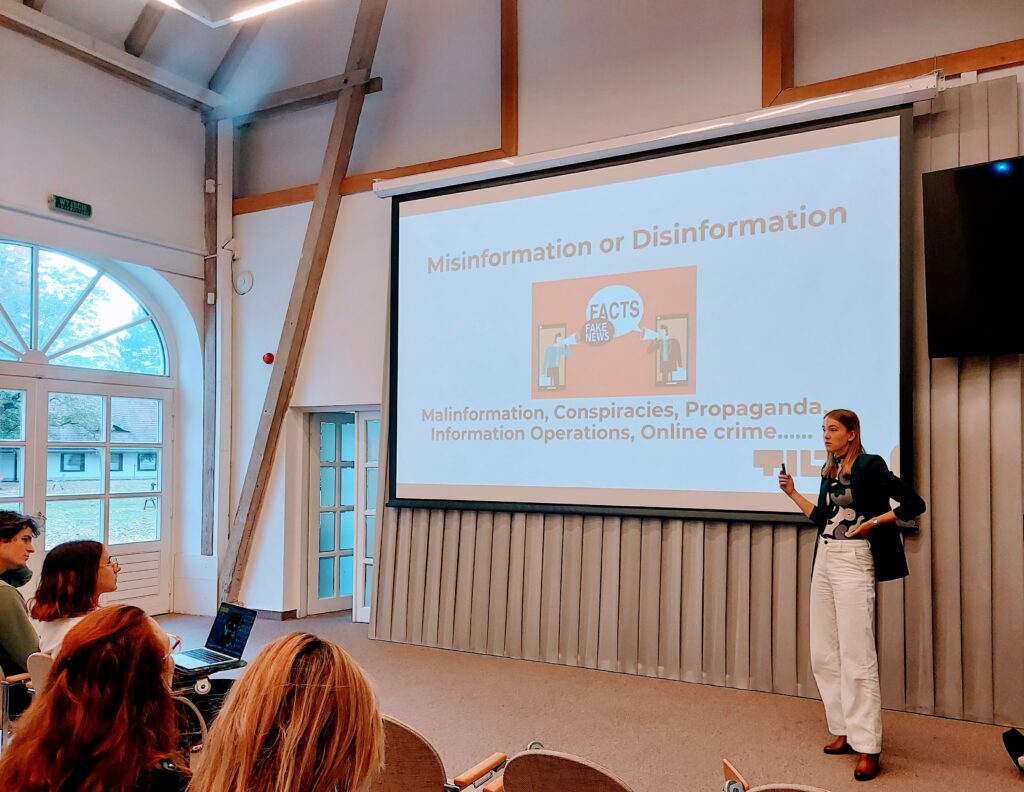Disinformation is a growing threat in the European Union with geopolitical and democratic implications. Through the spread of false information with the aim of misleading, some external actors can endanger and undermine EU values for their own sake. This takes place in many contexts, such as elections, the COVID-19 pandemic or Russia’s war in Ukraine. In face of this growing challenge, it thus appears essential to develop strategies to counter disinformation and build resilience.
As part of the Media and Disinformation Nest, the College of Europe in Natolin welcomed two workshops on these issues:
- A role play named ‘Factwarrior’ on the inner workings of disinformation campaigns on October 14th;
- A discussion on the use of open-source intelligence to investigate influence operations on November 4th.
The threat of disinformation and its operational dynamics
Leveraging disinformation as a strategic tool for shaping certain narratives among societies is not a recent phenomenon. Propaganda and conspiracy theories can be found throughout history. Nevertheless, it is our contention, and a sentiment shared by many in the expert community, that, in tandem with technological progress, disinformation campaigns assume a more profound and pervasive dimension in our contemporary societies.
Disinformation actors use heterogeneous tactics, among them maneuvering with fake accounts and thousands of trolls and bots on social media. In many cases, they utilize internet platforms to impersonate media outlets or institutions and spread false information on their behalf.
Specifically, the manipulation of the audience’s emotions is systemically applied. The latter has often been the case while spreading fake ‘personal stories’ and conspiracies about the disastrous consequences of the COVID-19 vaccines. All this can lead to division and polarization in society, the radicalization of ideas, social unrest, increased cybercrime, and even influence on elections or political processes. Clearly, the entirety of the aforementioned elements poses a significant threat to the development of modern societies.
When examining information operations and propaganda, Russia’s disinformation tactics come to the fore. With the aim of having an increased influence on political processes, the most commonly targeted entities by the Kremlin are the former Soviet countries.
For instance, Russia continues spreading disinformation in Georgia by promoting specific narratives that directly target Georgian existential aspirations. The intentions are:
- To undermine Georgian statehood (claiming that it does not have real sovereignty).
- To attenuate Georgia’s European aspirations (arguing that the West is taking away Georgia’s traditions, religion, culture, values, etc.).
- To threaten Georgia’s NATO membership.
Building resilience through innovative strategies
In order to counter disinformation, public authorities have developed disinformation policies in the past years gathering several types of strategies. There are three main types that can intervene at different stages of a disinformation campaign:
- Education and media literacy, which consists of educating the population on the way to approach the media and avoid falling for disinformation;
- Prebunking which aims to warn people about disinformation before the campaign reaches them;
- Fact-checking, which verifies the accuracy of news spread online and thus intervenes after the spread of disinformation.
However, building resilience against disinformation is not limited to these three types of policies. During the workshops, students were introduced to new tools that approach the issue in an innovative way. The first one is a game created by the company TILT, whose objective is to make players understand the inner workings of disinformation campaigns. It changes their perspective by putting them in the shoes of someone who creates a disinformation campaign. Players have to use strategies such as emotional language to create a campaign as effective as possible.
A second innovative approach consists in using open-source intelligence. This method allows to collect, verify and analyze online data to avoid falling for disinformation. Examples of open-source intelligence include: reverse image search on Google to verify the authenticity of an image and its context, geolocation to discern the geographic location of an object or facial recognition.
The challenges in the fight against disinformation
Despite all the existing approaches in the direction of informational resilience, the fight against disinformation is not a matter of simplicity. Open-source intelligence and other approaches may not be useful in all cases, as they also have their technological limits. On the other hand, the human psychology of belief is substantially vulnerable to fake information and conspiracies.
Narratives used in disinformation campaigns are often simple and easy to understand. They use emotional language and fit existing beliefs of the target audiences. They catch people’s attention and because of their repetitive nature, they are easy to believe. The algorithmic personalization of social media encourages this to a great extent. As a consequence, echo chambers and filter bubbles are formed which leads to selective exposure, reduced serendipity, and limited perspectives.
Thus, it becomes very difficult to convince people that what they have already believed is not fully connected with reality, especially since some types of disinformation spread at lightning speed.
Conclusion
To synthesize the key points discussed above, it is more than essential today to address the undergoing disinformation challenges. Several strategies have already been identified by public authorities and some private actors. Yet, effectively countering disinformation is a difficult task due to the uncertain and sprawling nature of the issue. It merits careful consideration that the issues regarding disinformation waves be addressed at their roots. Fostering social resilience will thus require to keep identifying innovative tools and act on the various sources of the problem.
Anna Denais is currently undertaking a Master’s degree in European Interdisciplinary Studies at the College of Europe, while completing her fifth year at Sciences Po Rennes. Her interests include issues of disinformation and digital transformation.
Mariami Japaridze is an MA candidate at the College of Europe (Natolin). She graduated from Tbilisi State University, majoring in International Relations. Being a civic activist in Georgia, she has experience working for USAID programs. Her interests center on Russia’s disinformation campaigns in EaP countries and security challenges in the Black Sea region.

